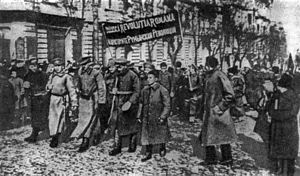Mihail Gheorghiu Bujor
[2] He subsequently moved to Bucharest and, starting with 1902, also became a regular contributor to România Muncitoare, the main socialist press venue revived by Christian Rakovsky.
[2] During this period he led an intense press activity towards the reorganisation of the Romanian socialist movement, coming to be recognised as one of its foremost representatives.
Among other actions, he issued a manifesto titled Către concentrați și rezerviști ("To the assembled and reserve soldiers"), calling on the army to stop firing on the rebels.
In 1910, the concentrated efforts of the members of the Socialist Union led to the organisation of a Congress for the restoration of the Social Democratic Party of Romania (PSDR).
Bujor participated in the 1914 extraordinary Congress of the PSDR and the July 1915 Bucharest Inter-Balkan Socialist Conference, which adopted strong anti-war declarations.
Thus, in a eulogy at the funerals of former party leader Ottoi Călin on April 16, Bujor denounced war as an instrument foreign to the interests of proletariat and urged the public to extend the influence of the Russian revolution.
[6] Considering socialists a threat to its authority and the stability of the front, the Romanian government decided to clamp down on the movement by dissolving the clubs, banning their publications, and arresting their leaders, including Bujor.
The committee, which also included socialists Ion Dic Dicescu, Alexandru Nicolau, and Alter Zalic, sought to mobilize the sizeable Romanian workers population in the region, many of them evacuated from Romania along with strategic factories in the wake of the German invasion.
Bujor also maintained contact with the socialists in Iași, supplying them with printed manifestos, and in Odessa he organised a revolutionary armed battalion from local Romanian soldiers.
[11] In February 1918 Bujor met Lenin, who appointed him a member in the High College for the Struggle against Counter-revolution in the South, a provisional military command.
[4][8] Together with Dicescu, he edited a collection of secret documents from the Russian diplomatic archives, exposing the negotiations between Romania and Entente predating the former's entry into war, as well as later French-Russian talks dismissing Romanian territorial claims.
The committee decided to fight against the Romanian government, whom they considered to be controlled by the bourgeoisie and the landowners, and to help start a revolution inside the country.
[4] In March 1919 he was appointed to the southern bureau of the newly founded Third International,[13] and between May and June he served as People's Commissar for Foreign Affairs in the provisional government of the short-lived Bessarabian Soviet Socialist Republic.
During World War II, as Romania joined Nazi Germany in the invasion of the Soviet Union, he was interned along other prominent communists in the Târgu Jiu camp.
The elder Bujor received several honorific positions after Joseph Stalin's death, such as the presidency of the Association of the Former Antifascist Political Prisoners and membership in the General Council of the International Federation of Resistance Fighters.
